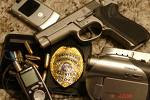
The phone rings, you pick it up, and the caller identifies himself as an officer of the court. He says you failed to report for jury duty and that a warrant is out for your arrest. You say you never received a notice. To clear it up, the caller says he'll need some information for "verification purposes"-your birth date, social security number, maybe even a credit card number.
This is when you should hang up the phone. It's a scam.
Jury scams have been around for years, but have seen a resurgence in recent months. Communities in more than a dozen states have issued public warnings about cold calls from people claiming to be court officials seeking personal information. As a rule, court officers never ask for confidential information over the phone; they generally correspond with prospective jurors via mail.
The scam's bold simplicity may be what makes it so effective. Facing the unexpected threat of arrest, victims are caught off guard and may be quick to part with some information to defuse the situation.
"They get you scared first," says a special agent in the Minneapolis field office who has heard the complaints. "They get people saying, 'Oh my gosh! I'm not a criminal. What's going on?'" That's when the scammer dangles a solution-a fine, payable by credit card, that will clear up the problem.
With enough information, scammers can assume your identity and empty your bank accounts.
"It seems like a very simple scam," the agent adds. The trick is putting people on the defensive, then reeling them back in with the promise of a clean slate. "It's kind of ingenious. It's social engineering."
More Information
Want to learn more about new and common scams like this one? Then sign up for our e-mail alerts.
In recent months, communities in Florida, New York, Minnesota, Illinois, Colorado, Oregon, California, Virginia, Oklahoma, Arizona, and New Hampshire reported scams or posted warnings or press releases on their local websites. In August, the federal court system issued a warning on the scam and urged people to call their local District Court office if they receive suspicious calls. In September, the FBI issued a press release about jury scams and suggested victims also contact their local FBI field office.
In March, USA.gov, the federal government’s information website, posted details about jury scams in their Frequently Asked Questions area. The site reported scores of queries on the subject from website visitors and callers seeking information.
The jury scam is a simple variation of the identity-theft ploys that have proliferated in recent years as personal information and good credit have become thieves' preferred prey, particularly on the Internet. Scammers might tap your information to make a purchase on your credit card, but could just as easily sell your information to the highest bidder on the Internet's black market.








